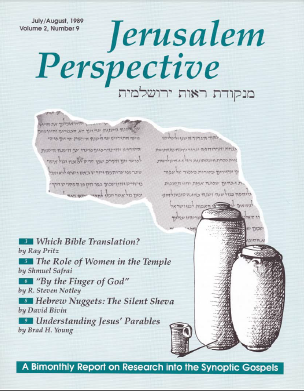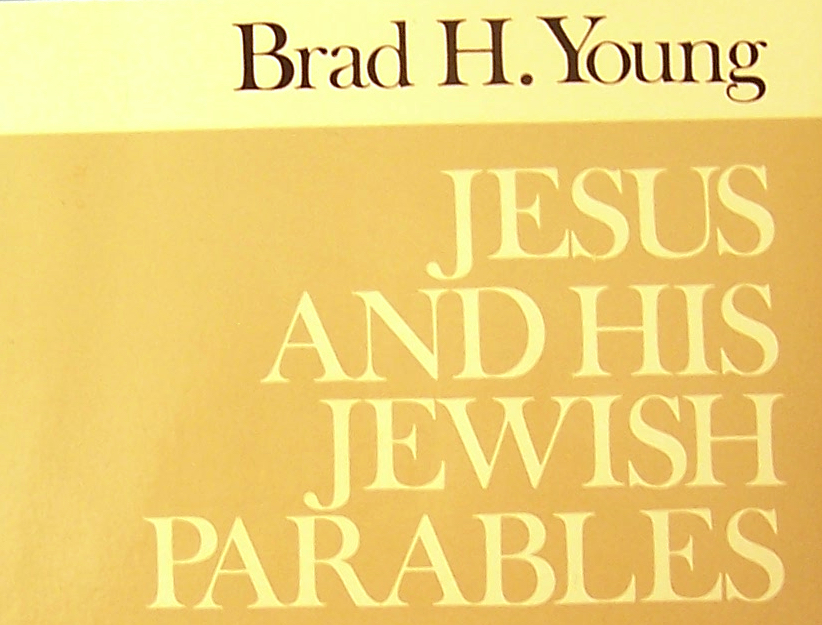
I am pleased to recommend Brad Young’s research into the parables of Jesus, and I am sure that his new book, Jesus and His Jewish Parables (Mahwah, NJ: Paulist Press, 1989), will help its readers gain a clearer understanding of Jesus’ words and teaching.
There is no question that the way to understanding Jesus leads through his Jewishness. To be a Jew in Jesus’ day meant learning not only the Hebrew Bible but also a wealth of rabbinic interpretation. Jesus’ contemporaries called him “Rabbi” (Teacher) and my experience has shown me that Jesus was a very learned man. His words were sometimes simple as salt (e.g., Matt. 16:26), but even in such cases he alluded to Jewish learning, and he sometimes also spoke as a rabbinical authority (e.g., Matt. 12:11-12).
A knowledge of this Jewish background is vital for a modern reader to understand what Jesus really meant. You do not have to be Jewish to be nourished by Jesus’ bread, but to become a New Testament scholar it is essential to acquire a sound knowledge of ancient Judaism. If you want to understand Jesus’ parables without becoming a scholar, you have to find a teacher who is an expert in Jewish matters. Dr. Young is such an expert, a scholar whose books reveal new aspects both in Jewish and in New Testament research.
There is no need to fear Jesus’ Jewishness. Paul has written with great insight “that Christ became a servant to the circumcised to show God’s truthfulness, in order to confirm the promises given to the patriarchs, and in order that the Gentiles might glorify God for his mercy” (Rom. 15:8-9). This statement not only fits the “history of salvation,” but also expresses the ties between Jesus’ Jewish learning and the Jewish character of the Christian message. This connection is especially valid for the interpretation of the parables in the Gospels.
Parables are typical of rabbinic literature, and do not exist in any anterior or posterior civilization, not even in the Jewish Scriptures, Dead Sea Scrolls, Apocrypha or Pseudepigrapha. Even the language of the parables seems to be prescribed: from the very beginning of the genre until the last rabbinic parables of the early Middle Ages, the language of the parables is always Hebrew, never Aramaic. It is often overlooked that Jesus’ parables belong to this specific, well-defined literary form which was a creation of Jewish culture, more precisely of the rabbinic Pharisaic movement.
Just as no real parables exist outside of rabbinic literature, so one does not find parables of Jesus outside of the synoptic Gospels. Without knowing the established themes and motifs of rabbinic parables, it is very difficult to learn what Jesus was teaching us with his Jewish parables.
Jesus and His Jewish Parables is an important step in understanding the rabbinic context within which Jesus presented his parables. Dr. Young’s knowledge of the Jewish background of Jesus’ parables is astonishing. This, and his gift of analysis and synthesis, created a wonderful book.
“Which of you desiring to build a tower does not first sit down and count the cost…?” (Luke 14:28-30). The moral of this parable could be applied to the study of Jesus’ parables: A knowledge of their rabbinic counterpart is necessary before one can begin to study them. There is a strong likelihood that a scholar who does not prepare himself by studying rabbinic parables will be ridiculed in the words of Jesus’ parable: “This man began to build and was not able to finish.”
Anyone who wants to be a good worker in the field of Jesus’ parables should begin by studying Brad Young’s Jesus and His Jewish Parables. The treasure is no longer hidden!

Paid Content
Premium Members and Friends of JP must be logged in to access this content: Login
If you do not have a paid subscription, please consider registering as a Premium Member starting at $10/month (paid monthly) or only $5/month (paid annually): Register
One Time Purchase Rather Than Membership
Rather than purchasing a membership subscription, you may purchase access to this single page for $1.99 USD. To purchase access we strongly encourage users to first register for a free account with JP (Register), which will make the process of accessing your purchase much simpler. Once you have registered you may login and purchase access to this page at this link:


![David Flusser [1917-2000]](https://www.jerusalemperspective.com/wp-content/uploads/userphoto/21.jpg)




























































































